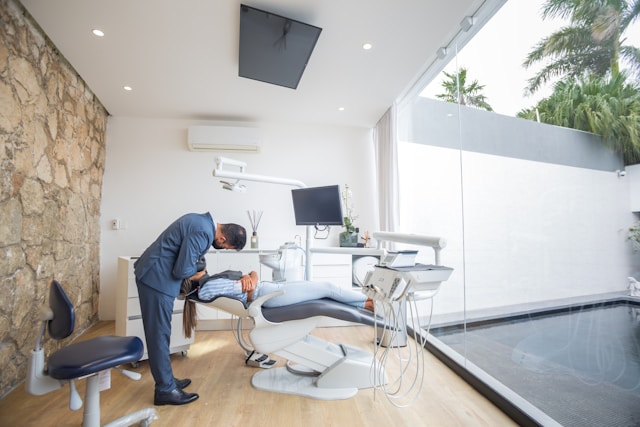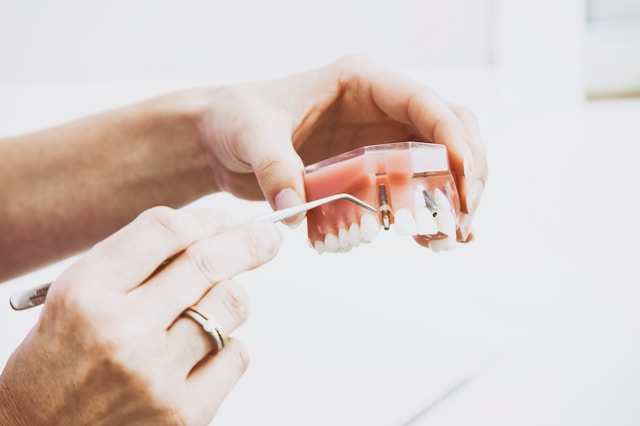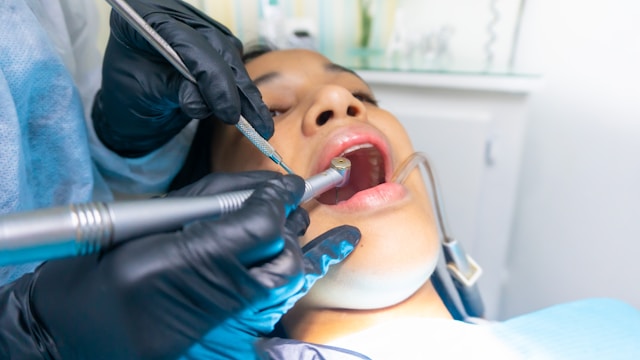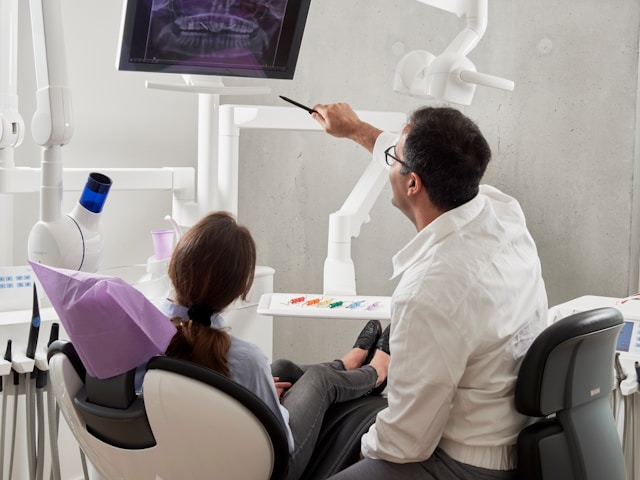



Dealing with dental anxiety can be a significant barrier to maintaining excellent oral health. Yet, with the innovative strategies developed by dental specialists in Upper West Side NYC, it’s possible to manage and even conquer these fears. From selecting an empathetic dentist, to incorporating cognitive behavioral techniques and considering sedation options, there are various paths to navigate through dental anxiety. So how do these strategies work, and what’s the real impact on patients’ experiences? Let’s explore the insights from these NYC professionals and the transformative effects of their approach.
Understanding Dental Anxiety
While it may seem an uncommon phenomenon, dental anxiety is a real and significant concern that affects a wide range of individuals, often preventing them from receiving necessary dental care. This type of phobia is not a simple fear; rather, it is a complex web of anxiety origins and triggers that intertwine to create a barrier between the individual and dental health.
The roots of dental anxiety often stem from previous negative experiences, such as painful procedures or insensitive remarks from dental professionals. These experiences can leave a lasting impression, causing even routine check-ups to be sources of distress. Environmental factors such as the clinical setting, dental tools, sounds, and even smells can also act as anxiety triggers.
Understanding the origins and triggers of dental anxiety is the first step towards managing it effectively. By acknowledging these factors, both patients and dental professionals can work together to create a positive and comfortable dental experience. Furthermore, being aware of the triggers can help individuals seek appropriate therapies or interventions to reduce their anxiety levels. Dental anxiety should not be a barrier to maintaining good oral health.
Signs Of Dental Phobia
Identifying the signs of dental phobia is a crucial step towards addressing and overcoming such fears. These signs can manifest in various ways and have a substantial impact on the overall oral health of an individual. In this section, we will discuss the common symptoms of dental phobia and its potential effects on oral health.
Recognizing Dental Fear
Understanding the signs of dental fear, often referred to as dental phobia, is an essential step towards managing and eventually overcoming this commonly experienced anxiety. The fear origin may stem from past negative experiences or stories heard from others. Anxiety triggers can vary, but commonly include the sight of dental instruments, the sound of the drill, or simply the thought of an upcoming appointment. Some individuals may experience physical symptoms such as sweating, rapid heartbeat, or even panic attacks. Others may exhibit avoidance behavior, such as repeatedly canceling appointments. Recognizing these signs is vital not only for patients to understand their own fear but also for dental professionals to provide tailored, empathetic care.
Impact on Oral Health
Neglecting to address dental phobia can lead to severe consequences on one’s oral health, emphasizing the importance of managing this fear effectively. Anxiety Induced Neglect often results in an individual avoiding regular dental check-ups and treatments, which can exacerbate existing oral health issues or lead to new ones.
Oral Health Consequences of such neglect can include gum disease, tooth decay, and even tooth loss. Additionally, untreated oral health conditions can contribute to other systemic health issues, such as diabetes and heart disease. Hence, understanding and addressing dental anxiety is not only about maintaining a beautiful smile; it is an essential aspect of overall health management. Our expert team on the Upper West Side is here to help you overcome your fears and maintain excellent oral health.

Impact On Oral Health
The detrimental effects of dental anxiety can often lead to serious oral health complications, as fear prevents individuals from seeking regular dental care. Neglecting oral hygiene due to anxiety contributes to Oral Health Consequences, like Anxiety Induced Tooth Decay. The avoidance of routine check-ups and cleanings can escalate minor issues into major problems, resulting in pain, infection, and even tooth loss.
- Tooth Decay and Cavities: Anxiety-induced avoidance of the dentist leads to a buildup of plaque and tartar, which can cause cavities and tooth decay over time.
- Gum Disease: Lack of regular professional cleanings can result in gum disease, beginning as gingivitis and potentially advancing to periodontitis – a serious condition that can lead to tooth loss.
- Bad Breath and Discoloration: Chronic neglect of oral care can cause persistent bad breath and yellowing of the teeth, impacting one’s confidence and social interactions.
Understanding the potential consequences of dental anxiety is the first step towards overcoming it. Remember, seeking timely dental care can prevent these issues and promote a healthier, more confident smile. Your oral health is integral to your overall well-being, and it’s never too late to start taking care of it.
Professional Help: An Overview
Recognizing the serious implications of dental anxiety on oral health, it becomes apparent that professional intervention can play a significant role in mitigating these fears and promoting regular dental care. Consult with a dental specialist who can offer a range of therapeutic interventions, tailored to the individual’s specific anxiety triggers and designed to build confidence and familiarity with the dental environment.
Dental professionals are trained to recognize and understand the underlying anxiety triggers that drive dental anxiety. These may include fear of pain, past traumatic experiences, or feelings of helplessness. By identifying these triggers, professionals can provide personalized care and support to help patients manage their fears.
Once the triggers are identified, therapeutic interventions come into play. These interventions may include cognitive behavioral therapy (CBT), which is an effective treatment for anxiety disorders. CBT works by helping patients challenge and change their thought patterns and behaviors, thereby reducing their anxiety.
In addition to CBT, professionals may also utilize other interventions such as relaxation techniques, distraction strategies, or even medication to help manage anxiety during dental visits. All these approaches aim to provide a comfortable and anxiety-free dental experience for patients, thereby improving their oral health.
Upper West Side’s Approach
Adapting to the unique needs of patients, dental professionals on the Upper West Side employ a thorough, empathetic approach to address dental anxiety. The approach involves a combination of advanced technology, anxiety management tools, and a robust patient support system.
- Advanced Technology: The use of modern technology makes procedures less invasive and more comfortable, reducing the anxiety associated with traditional dental tools.
- Anxiety Management Tools: Dental professionals utilize an array of tools to manage anxiety. These include soothing music, distraction techniques, and oral sedatives. These tools are tailored to each patient’s needs and preferences to ensure maximum comfort.
- Patient Support System: A strong emphasis is placed on establishing a supportive environment. This involves clear communication about procedures, allowing patients to express their fears, and offering reassurances.
The Upper West Side approach is specifically designed to help patients feel more at ease during dental visits. By employing this empathetic and tailored approach, dental anxiety can be effectively managed, allowing patients to receive necessary dental care without the undue stress and fear. The ultimate aim is to make dental care a more comfortable, less intimidating experience for everyone.

Relaxation Techniques For Patients
Incorporating relaxation techniques into the patient’s visit, dental professionals can further alleviate dental anxiety and foster a more calming, serene environment. Breathing exercises, for example, can serve as a cornerstone in this approach. These exercises, which involve deep and slow inhalation followed by a gradual exhalation, can help patients regain control over their bodily responses to stress, ultimately leading to a decrease in anxiety levels.
Progressive muscle relaxation is another effective technique. This method encourages patients to tense and then release different muscle groups, promoting a sense of tranquility and well-being. Starting from the toes and moving up towards the head, this practice can reduce the physical symptoms of anxiety, like rapid heart rate and shallow breathing.
To maximize the benefits of these techniques, patients should be guided by professionals during their first few attempts. As they become more comfortable with the process, they can then apply these techniques by themselves during subsequent visits. By integrating these relaxation strategies into dental visits, we can create a more positive, less stressful experience for patients, contributing to better dental health outcomes in the long run.
The Role Of Communication
Clear and compassionate communication between the dental professional and the patient plays a pivotal role in mitigating dental anxiety. Establishing a healthy Dental Dialogue allows the patient to express their fears or concerns, leading to a more personalized and comfortable treatment plan. This process also fosters Patient Empowerment, as the patient gains a sense of control over their dental treatment.
There are three key aspects of effective communication in a dental setting:
- Transparency: The dental professional should clearly inform the patient about the treatment, its purpose, and the procedures involved. This eliminates any fear of the unknown, reducing anxiety.
- Reassurance: The dental professional should provide constant reassurance during the treatment, emphasizing their skill and experience in handling similar cases. This boosts the patient’s confidence in the professional’s abilities, further reducing fear.
- Active Listening: The dental professional should actively listen to the patient’s concerns, validating their feelings and addressing their worries. This shows the patient that their feelings matter, promoting a sense of security.
In essence, effective communication fosters a supportive environment that empowers the patient, leading to a significant reduction in dental anxiety.
Benefits Of Sedation Dentistry
Sedation dentistry offers a solution for those who experience dental anxiety, providing a way to receive necessary dental care without the associated stress and fear. It involves the use of medication to create a relaxed, easy state during dental procedures, ranging from minimal to deep sedation. In this section, we will explore the benefits of different sedation methods, highlighting their advantages and potential drawbacks.
Understanding Sedation Dentistry
Exploring the world of sedation dentistry, it’s essential to acknowledge the significant benefits this approach offers, especially for patients dealing with dental anxiety. This practice not only helps to alleviate stress and fear but can also make dental procedures more accessible and manageable. However, it’s important to take into account factors such as Sedation Costs and Dental Insurance.
- Pain-Free Treatment: Sedation dentistry can provide a virtually pain-free experience, removing a primary deterrent for many patients.
- Efficiency: With the patient relaxed, dentists can perform more extensive procedures in less time.
- Reduced Trauma: The memory of the procedure is often vague or non-existent, helping to mitigate future dental anxiety.
Understanding sedation dentistry is the first step towards overcoming dental fear and ensuring a healthier life.
Sedation Methods: Pros & Cons
Having grasped the concept and advantages of sedation dentistry, let’s now examine the various methods employed in this practice, considering their respective pros and cons to better inform patients suffering from dental anxiety. The most common sedation methods include inhalation of nitrous oxide, oral sedation, IV sedation, and general anesthesia. Each method varies in both sedation costs and patient experiences. For example, nitrous oxide, or “laughing gas,” is relatively inexpensive and offers immediate relief, but its effects are short-lived. Oral sedation, while more costly, provides longer-lasting anxiety relief. However, it requires advance preparation. In contrast, IV sedation and general anesthesia offer deep relaxation but at higher costs and with potential side effects. Choose wisely for your comfort and budget.

Cognitive Behavioral Therapy (CBT)
One effective strategy for managing dental anxiety, as suggested by experts in New York City, is the utilization of Cognitive Behavioral Therapy (CBT). CBT techniques have proven to be highly beneficial in addressing the fear and apprehension associated with dental procedures. This therapy primarily involves altering the thought patterns that lead to anxiety, providing a more constructive perspective towards dental treatments.
The therapy success rate of CBT is commendable, with a significant number of patients reporting a reduction in their dental anxiety levels. This is achieved through a three-step process:
- Identification: Recognizing the thoughts and scenarios that trigger dental anxiety.
- Challenge: Learning to question these fear-inducing thoughts and assess their validity.
- Replacement: Replacing irrational fears with more realistic and positive thoughts.
CBT is often a short-term therapy, typically consisting of 6-10 sessions, and the effects can be long-lasting. The treatment does not provide an immediate remedy but equips patients with the tools to manage their anxiety effectively over time. It is important to remember that seeking professional help like CBT is a courageous step towards overcoming dental anxiety.
Success Stories From NYC
We now turn our attention to the real-life success stories emerging from New York City, showcasing individuals who have conquered their dental anxiety. These accounts, encompassing a range of experiences from overcoming fear to achieving anxiety-free dental visits, provide both inspiration and practical advice. They serve as a proof to the effectiveness of the strategies and interventions discussed in this article, demonstrating that overcoming dental anxiety is indeed possible.
Overcoming Fear: NYC Cases
In the bustling city of New York, numerous individuals have successfully overcome their dental fears, proving that with the right approach and professional help, dental anxiety can indeed be conquered.
- Case One: Recognizing ‘Anxiety Triggers’ was the key for Jane, a 35-year-old accountant. By acknowledging her fear of needles and discussing it with her dentist, she found a way to manage her anxiety.
- Case Two: Michael, a 50-year-old teacher, found solace in a ‘Supportive Environment’. His dentist’s office, filled with compassionate staff and calming music, helped him overcome his dental phobia.
- Case Three: Sarah, a 28-year-old artist, combined therapy and relaxation techniques to conquer her fears. She is now an advocate for mental health and dental care integration.
These stories underline the importance of understanding and dealing with dental anxiety.
NYC’s Anxiety-Free Dental Visits
Building on the victorious experiences of individuals such as Jane, Michael, and Sarah, it’s evident that New York City is home to numerous instances of successful, anxiety-free dental visits. These stories reflect the impact of dental technology advancements and the benefits they offer to those with dental phobias. Digital X-rays, sedation dentistry, and computer-guided anesthesia delivery have transformed the patient experience, minimizing discomfort and fear.
Moreover, a vital office environment plays a significant role in making these visits stress-free. Soft ambient music, soothing decor, and empathetic staff help create an atmosphere of calm and tranquility. NYC’s dental practices are equipped with these key elements, providing a safe space for patients to overcome their dental anxieties.
Maintaining Dental Routine Post-Anxiety
After successfully managing dental anxiety, it’s important to establish a consistent oral hygiene routine to preserve your dental health and prevent anxiety from resurfacing. Anxiety triggers such as dental tools fear can derail the progress you’ve made. However, maintaining your dental routine post-anxiety can become less challenging by following some steps.
- Familiarize Yourself with Dental Tools: Understanding what each tool does can diminish the fear factor. Ask your dentist to explain the tools’ functions, turning the unknown into the known, thereby reducing anxiety.
- Gradual Exposure: Begin with simple procedures like cleanings before moving on to more complex ones. This gradual exposure can help you acclimate to dental visits and reduce the chances of a relapse into anxiety.
- Practice Relaxation Techniques: Techniques such as deep breathing and mindfulness can help manage anxiety triggers. Employ these techniques before and during dental appointments to create a calming environment.

Frequently Asked Questions
What Are Some Natural Remedies to Reduce Dental Anxiety?
Natural remedies such as herbal supplements can bring significant benefits in reducing dental anxiety. Additionally, practicing mindfulness techniques, like deep breathing and visualization, can also help manage stress and fear associated with dental procedures.
How Can Parents Help Their Children Overcome Fear of Dentists?
Parents can help children overcome dental fear by introducing Child Focused Dentistry. Techniques such as Dental Play Therapy can make visits less intimidating, teaching kids about procedures through play to foster understanding and reduce anxiety.
What Is the Difference Between Dental Anxiety and Dental Phobia?
Dental anxiety often pertains to unease or worry about dental procedures, while dental phobia is a more severe, irrational fear causing individuals to avoid dental care altogether. Both involve phobia development and anxiety triggers.
How Does Dental Anxiety Impact Overall Mental Health?
Dental anxiety’s influence on overall mental health is significant, often manifesting as stress and fear. This emotional toll can lead to avoidance of necessary dental care, potentially exacerbating existing oral health issues and impacting self-confidence.
Are There Any Online Support Groups for People With Dental Anxiety?
Yes, numerous online support groups exist for individuals experiencing dental anxiety. These platforms offer virtual therapy benefits and online community support, enabling people to share experiences, strategies, and receive professional advice.
